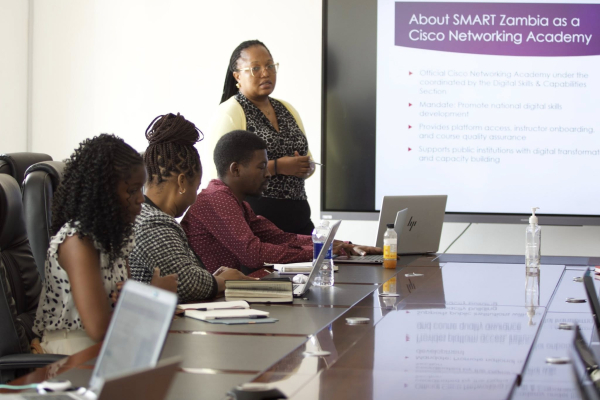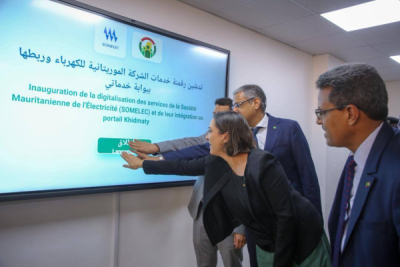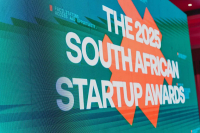-
Central bank launches work on a national instant payment platform
-
System aims to speed up transactions and expand financial inclusion
-
Project relies on open, interoperable technology
Guinea’s central bank, the Banque centrale de la République de Guinée (BCRG), launched work on the implementation of an instant payment system (SPI) on December 18. The digital infrastructure is designed to modernize payment methods and support broader financial inclusion in the country.
At the opening ceremony, BCRG First Vice Governor Mohamed Lamine Conté said the project stems from a consultative process that involved banks, electronic money institutions, microfinance institutions, and fintech companies. He said the SPI will allow users to send and receive funds in real time, at any time of day and without geographic constraints. The system is expected to address delays linked to traditional payment channels and support both merchant payments and personal transfers.
From a technical standpoint, the BCRG has opted for a public, open, and interoperable infrastructure based on Mojaloop technology. According to the central bank, this choice aims to limit technological dependence, encourage local innovation, and foster competition among financial service providers. Under this setup, real-time transfers will be possible between bank accounts, mobile wallets, and other payment instruments, laying the groundwork for a more integrated financial ecosystem.
The project takes shape as Guinea continues to face challenges in financial inclusion. BCRG data show that 23% of adults hold an account with a financial institution, up from 7% ten years ago. Despite this progress, the rate remains below the average for sub-Saharan Africa, even as digital financial services gain traction.
Mobile money services continue to expand in this context. Transactions through mobile money rose by 8.6%, from 43,077 billion Guinean francs ($4.9 million) in the previous quarter to 46,795 billion in the second quarter of 2024, reflecting growing reliance on digital solutions as alternatives to traditional banking.
At the regional level, the SPI aligns with a broader African trend toward instant payment systems, which now process tens of billions of transactions each year. Cross-border platforms such as the Pan-African Payment and Settlement System (PAPSS) highlight the importance of robust national infrastructures that can connect with regional mechanisms and support deeper economic integration.
While the operational timeline for Guinea’s SPI has yet to be specified, the expected benefits remain significant. By reducing cash usage and enabling secure, instant transactions, the system is expected to improve financial flows for households, businesses, and the public sector. Effective interoperability could also lower transaction costs and strengthen transparency and trust in the formal financial system.
Samira Njoya
- Smart Zambia launched a decentralized digital skills training program across government institutions.
- The initiative trains civil servants to manage and deliver courses via the Cisco Networking Academy platform.
- Zambia’s digital transformation could generate ZMW 28.64 billion ($1.26 billion) in added value by 2028, according to GSMA.
Smart Zambia, the public agency responsible for digital transformation in Zambia, announced the launch of a decentralized digital skills training program within government institutions. The agency announced the initiative on December 17, and said it aims to accelerate the implementation of the authorities’ digital ambitions.
The program began with an orientation session that brought together about ten instructor officers from the Ministry of Defence, the Ministry of Justice, the National Science and Technology Council, the Ministry of Finance and National Planning, the Ministry of Mines and Minerals Development, the Ministry of Small and Medium Enterprise Development, and the University of Zambia.
The program trained participants on learner enrollment procedures and support mechanisms on the Cisco Networking Academy platform, as part of their duties as instructors. The initiative seeks to expand access to free training in digital literacy and applied digital skills across the civil service.
“By empowering Ministries and institutions to directly manage enrolment and basic administration of the courses, the initiative seeks to increase reach, promote institutional ownership, and ensure the long term sustainability of digital skills development across Government,” Smart Zambia said in its statement.
Digital skills development represents a core pillar of Zambia’s digital transformation agenda to improve the efficiency, security, and citizen-centric orientation of public services. The Organisation for Economic Co-operation and Development (OECD) has also emphasized the need to invest in civil servant capabilities, as digital technologies offer significant potential to modernize public administration.
The GSMA estimates that continued digital transformation could generate added value of 28.64 billion Zambian kwacha, or about $1.26 billion, by 2028 across agriculture, trade, manufacturing, transport, and public services.
This article was initilally published in French by Isaac K. Kassouwi
Adapted in English by Ange Jason Quenum
- Algerian entrepreneur Mohammed Benchaa co-founded Somu Raqami to centralize and automate corporate training management.
- Founded in 2022, the platform unifies onboarding, procedures, and skills development into a single system.
- Somu Raqami uses data and reporting to help organizations track performance and improve learning outcomes.
Mohammed Benchaa is an Algerian entrepreneur and a graduate of Kasdi Merbah University in Ouargla. He co-founded and leads Somu Raqami, an online solution dedicated to modernizing and centralizing internal training within organizations. The platform allows companies to track learning activities, develop skills, and improve team performance in a structured way.
Founded in 2022, Somu Raqami delivers a unified system that manages and monitors all training activities within an institution. The system covers new employee onboarding, procedure updates, and continuous skills development. The solution automates many training-related tasks, which saves time for teams and makes learning paths more efficient and professional.
The platform adapts to each organization both visually and functionally to remain consistent with its identity and specific needs. It brings all corporate training categories into a single space, thereby preventing the dispersion of content and tools.
Somu Raqami also improves learner monitoring through detailed data and reports that analyze progress, engagement levels, and individual results. These insights help managers assess program effectiveness, adjust content, and manage training as a strategic performance driver.
In parallel, Mohammed Benchaa works as an independent digital marketing specialist. He also serves as head of marketing at Somu Academy, an education platform launched in 2024 that offers recorded online courses focused on freelance careers, including marketing, design, and programming.
This article was initially published in French by Melchior Koba
Adapted in English by Ange Jason Quenum
- Tunisian entrepreneur Omar Hammami founded AgentHub.digital in January 2025 to help companies deploy ready-to-use AI agents.
- The platform targets sales, marketing, content creation, and customer service tasks with 24/7, multilingual automation.
- Hammami also launched ScInter in June 2025 to support research and innovation teams with AI-driven knowledge analysis.
Omar Hammami is a Tunisian entrepreneur and an engineer specializing in artificial intelligence and data science. He founded and leads AgentHub.digital, an online platform designed for companies that want to deploy ready-to-use artificial intelligence agents quickly.
Hammami founded AgentHub in January 2025 and positioned it as an end-to-end solution that allows organizations to create, deploy, and scale AI agents capable of handling key operational tasks. The platform seeks to help teams deliver tangible results faster while adopting artificial intelligence in a gradual and controlled manner. AgentHub emphasizes ease of use and process control.
AgentHub offers preconfigured AI agents that developers tested under real-world conditions and that companies can deploy in a short timeframe to generate immediate operational outcomes. These agents continuously learn and adapt, which improves performance over time and increases their contribution to business activity.
The platform highlights agents that can identify and close commercial opportunities on a continuous basis, including outside regular business hours. Other agents focus on content creation, marketing campaign management, sales growth support, and customer request handling on a 24-hour, seven-day basis and in multiple languages.
In June 2025, Hammami also founded ScInter, a platform designed for research and innovation teams. ScInter uses artificial intelligence to simplify access to internal information while remaining usable by non-technical staff. The solution automatically analyzes documents, reports, notes, and other materials to extract key insights and establish relevant links between them.
Hammami holds a degree in electrical engineering from the National Engineering School of Gabès in Tunisia. He also earned a master’s degree in applied computer science from Stanford University in the United States.
He began his professional career in 2019 at IamFuture, a Dutch fintech company, where he served as chief technology officer. In 2022, he joined Tunisian IT agency ENVAST as a machine learning engineer. In 2023, he moved to Cognism, a UK-based business intelligence company, where he worked as an AI and data engineer. He later held the same role at TAWA Digital Talents from May 2023 to July 2025, supporting an all-in-one platform that enables brands to launch, manage, and analyze influencer marketing campaigns.
This article was initially published in French by Melchior Koba
Adapted in English by Ange Jason Quenum
- Mauritania launched a suite of digital services for the state electricity utility SOMELEC on the Khidmaty public services portal.
- The package enables remote subscriptions, payments, service requests, and meter self-readings, available 24/7.
- About 63% of Mauritania’s population did not use the internet in 2025, raising access concerns despite expanding e-services.
Mauritanian authorities launched, on Wednesday, December 17, a package of digitized services for the Mauritanian Electricity Company (SOMELEC). Citizens can now access these services through the Khidmaty digital public services portal.
“In the long term, the new digital package will allow citizens to benefit remotely from the company’s main services: subscriptions, contract terminations, transfers of subscriptions from one residence to another, payment of bills and fees, as well as breakdown requests and meter self-readings,” the Ministry of Digital Transformation and Administrative Modernization said in a statement published on social media.
According to the ministry, the initiative falls under the framework of “Support for Sectoral Digital Transformation” and aims to simplify daily life by making public services more accessible, faster, and available 24 hours a day, seven days a week. Since the start of the year, the executive has digitized dozens of services across sectors including health, insurance, education, justice, mining, policing, and transport.
To support this strategy, the Mauritanian government launched the “Digital-Y” project in January. The initiative carries funding of 4 million euros, or about $4.7 million, and operates in partnership with Germany. The project seeks to integrate digital tools into public administration to modernize services, strengthen administrative transparency, and stimulate economic and social development.
Officials say the Khidmaty portal allows citizens to access digitized public services securely and complete procedures online from any smartphone or computer available on the Mauritanian market. However, as more services migrate to the platform, questions remain over effective access. DataReportal estimates that about 63% of the population did not use the internet in 2025.
This article was initially published in French by Isaac K. Kassouwi
Adapted in English by Ange Jason Quenum
Egyptian scientific services platform Nawah Scientific has closed a $23 million Series A round in mixed financing—comprising equity, debt, and grants—to accelerate its regional expansion. The group plans to use the funds to launch a research center in Rwanda and expand laboratory capacity in Egypt and Saudi Arabia while modernizing its equipment. The goal is to position the region as a major hub for research and testing, serving both Africa and the Middle East.
Twelve startups were recognized at the third annual South African Startup Awards, which selected 44 finalists from 221 entries across 12 categories. The winners span various sectors—including AI, fintech, healthcare, mobility, and climate—illustrating the dynamism of South Africa's tech ecosystem and the emergence of high-impact solutions for both consumers and businesses.
Stealth Money has launched a self-custody Bitcoin service in Nigeria, which the platform describes as a first for the continent. Users can purchase a hardware wallet using nairas for delivery anywhere in the country. The service also provides personalized support to help users secure their holdings away from exchanges deemed vulnerable, thereby strengthening their financial sovereignty over their digital assets.
- Sierra Leone launched the “Learn2Earn” program with UNICEF to train young people for digital freelancing.
- A pilot cohort of 30 participants combines in-person training, virtual mentoring, and real freelance job applications.
- Internet penetration remains low at 20.7%, highlighting structural constraints to scaling digital work.
The Sierra Leonean government launched the “Learn2Earn” program on Wednesday, December 17, an initiative designed to strengthen youth employability through digital freelancing. The government is implementing the program in partnership with UNICEF. The initiative aims to prepare young people to generate online income at a time when traditional job opportunities remain scarce.
The pilot cohort brings together 30 participants enrolled in a one-month program that combines in-person orientation sessions, virtual mentoring, and applications for real freelance assignments. “The program was designed to support participants from learning to income generation through mentoring, hands-on practice, and accountability, with support from experienced freelancers operating on platforms such as Upwork and Bounty,” said Jesse Kamara, innovation lead at the Ministry of Communication, Technology and Innovation (MoCTI).
According to the ministry, Learn2Earn offers an alternative pathway for labor market integration within the global gig economy. The program aims to address the widening gap between the number of young people entering the labor market and the limited availability of conventional jobs. The initiative also aligns with the MoCTI’s objective to help create 65,000 jobs in the technology and innovation sectors. The World Bank estimates that 230 million jobs in sub-Saharan Africa will require digital skills by 2030.
The program comes amid mounting socioeconomic pressure. The African Development Bank estimates that youth unemployment in Sierra Leone reached 10% in 2022, while underemployment remained significantly higher. In addition, an Afrobarometer survey published in September showed that 57% of Sierra Leoneans have considered leaving the country, with 55% citing the search for better job opportunities.
Beyond skills development, the expansion of freelancing raises structural challenges. Young people face constraints related to access to digital equipment such as computers, suitable smartphones, and software. Reliable, high-quality, and affordable internet connectivity also remains critical. According to DataReportal, Sierra Leone counted 1.8 million internet users at the beginning of 2025, representing an internet penetration rate of just 20.7%.
This article was initially published in French by Isaac K. Kassouwi
Adapted in English by Ange Jason Quenum
- South African entrepreneur Kim Chulu Amina founded MindCiti to help users structure and present clear professional identities.
- The MindCiti Builder platform targets students, professionals, and organizations seeking to support skills development.
- The solution emphasizes soft skills and uses interactive and gamified tools to enhance learning and employability.
Kim Chulu Amina is a South African entrepreneur and designer. He is the founder of MindCiti, a startup that aims to help individuals build a clear, coherent, and controlled professional image. Through this digital solution, he addresses a central challenge in the professional world: the ability to present oneself clearly and in a structured manner when facing opportunities.
Founded in 2022, MindCiti developed an online platform that supports users in structuring their professional future. The platform brings together tools designed to improve self-awareness, highlight career paths, and prepare users for professional opportunities. The platform, branded MindCiti Builder, targets students, working professionals, and organizations that seek to support the skills development of their talent.
MindCiti Builder offers a dedicated environment for creating professional content such as résumés and portfolios. The platform guides users step by step in presenting their experiences, achievements, and skills in a structured and readable format. This approach aims to facilitate job applications and engagement with employers or institutions.
The platform places strong emphasis on human skills, commonly referred to as soft skills. These include communication, teamwork, problem-solving, and emotional intelligence. The platform relies on playful and engaging activities that stimulate reflection, critical thinking, and initiative. Mini-games and interactive experiences reinforce learning and encourage the adoption of lasting professional behaviors.
Alongside MindCiti, Kim Chulu Amina also founded Kimard Studio, a startup launched in 2012 that specializes in interactive digital solutions incorporating gamification. He also serves as chief technology officer at Ambani Africa, an educational platform designed for African primary school students that helps them learn and strengthen mastery of their mother tongue.
He has also initiated several other entrepreneurial projects, including the news platform Voonja, the online magazine Afrinterest, and the handcrafted bag brand EN Afrik. He earned a diploma in multimedia, graphic design, and visual communication in 2013 from Tshwane University of Technology in South Africa.
Between 2014 and 2023, Kim Chulu Amina worked as a freelance UX/UI designer. In parallel, from 2018 to 2024, he served as head of user experience at Gradesmatch, an education technology company specializing in career guidance, university preparation, and academic success support for African students.
This article was initially published in French by Melchior Koba
Adapted in English by Ange Jason Quenum
More...
- Zimbabwean entrepreneur Chido Dzinotyiwei co-founded Vambo AI to deliver artificial intelligence in users’ native languages.
- The platform prioritizes indigenous and local languages that remain underrepresented in digital technologies.
- Vambo AI combines writing, translation, and search tools to expand access to AI beyond dominant global languages.
Founded in 2023, Vambo AI places indigenous and local languages at the core of its technological vision. These languages remain largely underrepresented in the digital ecosystem. The company aims to provide tools of the same standard as those available for major internet languages, enabling users to think, create, and communicate in their own idiom.
The platform claims to deliver international-level artificial intelligence that combines performance and technical sophistication with intuitive language use. This approach seeks to reduce linguistic barriers that continue to limit access to information, opportunities, and digital tools for large segments of the population.
By integrating writing, translation, and search functions, Vambo AI positions itself as a digital companion for users who want to operate online in their native language. The platform promotes a more inclusive internet by valuing languages that global technology platforms often overlook.
Beyond Vambo AI, Chido Dzinotyiwei is a member of the OPUS entrepreneurs’ collective. She also founded Vambo Academy, an education technology platform launched in 2020 that focuses on preserving African languages through virtual learning. In 2022, she co-founded Akayi, a facilitator within Zimbabwe’s business ecosystem.
She graduated from the University of Cape Town with a bachelor’s degree in economics and finance, followed by a master’s degree in development finance from the Graduate School of Business. She began her professional career in 2020 at Standard Bank Group’s Corporate and Investment Banking division, where she worked for four years as an analyst in the finance and treasury unit.
This article was initially published in French by Melchior Koba
Adapted in English by Ange Jason Quenum
Cavista Technologies will hold its fourth hackathon on February 21-22, 2026, in Ikeja, Lagos. Open to students from universities and colleges in and around Lagos, the event will feature a 24-hour team challenge focused on developing practical technology solutions. Participants will compete for prizes worth several million naira and receive mentorship from members of Nigeria’s tech ecosystem.
Nigerian platform Bildup AI, which specializes in AI-powered personalized training, has closed a $400,000 funding round backed by angel investors. The capital will be used to grow the team, expand online offerings, and launch physical AI learning centers in Abuja and Lagos starting in 2026. The initiative aims to make digital skills more accessible to young Africans.
Delivery platform Chowdeck has partnered with startup GoLemon to stock its grocery warehouses and offer near-instant delivery through its app. While Chowdeck maintains control of its warehouse management and rapid logistics, GoLemon focuses on procurement, quality control, and scheduled grocery orders.















